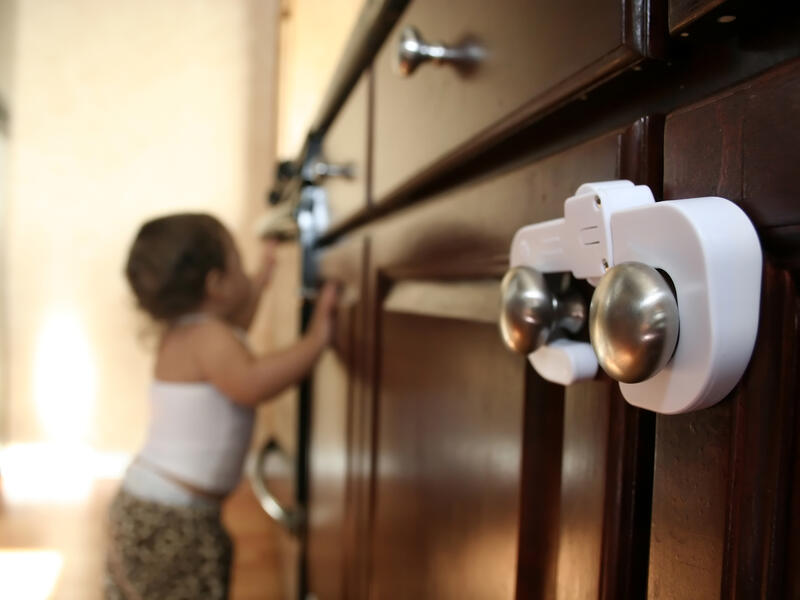Everyday common substances can poison children, which is why poison safety is so important.
In fact, the 55 U.S. Poison Control Centers provide telephone guidance for more than 2.1 million human poison exposures each year, or 1 poisoning case reported every 15 seconds. Additionally, children younger than 6 make up more than a third – 38% – of all poison exposures.
You can keep children safe by following simple poison safety steps. Here are some things you can do around your home.
Be prepared
You never know when an emergency might arise, and when it does, knowing you are prepared will help.
- Save the Poison Control number. Families should put the Poison Control number — (800) 222-1222, U.S. only — in, on or near their phones. Hang it on your refrigerator, save it in your cell phone contacts or any location that works best for you. Best-case scenario? You never need it. Worst-case scenario? You don’t waste precious moments looking up the number.
- Save the Poison Control website or app. Place poisonhelp.org as a browser favorite or download the app on your cell phone. Again, you might never need it, but if you do, you will appreciate having it readily available.
- Know when to call Poison Control and when to call 911. If your child collapses, stops breathing or has a seizure, please call 911.
- Update yourself on CPR and abdominal thrusts. Please update yourself regarding the basic CPR course. Most of the time it may be a lifesaving measure for your children before any emergency help arrives.
Alarm your home
Install a carbon monoxide alarm in every sleeping area of your home. According to the Centers for Disease Control, more than 400 Americans die each year from unintentional carbon monoxide poisoning, and over 20,000 Americans visit the emergency room for carbon monoxide poisoning with over 4,000 people hospitalized.
Proof your home
Poison-proof your home and anywhere your child spends time regularly. Ensure each room has been proofed for poisons, medications and other hazardous chemicals. Suggested options for poison safety are:
- Ask guests to store medications in places where children cannot reach.
- Avoid storing your medications in places that are easily accessible, such as pillboxes, purses, backpacks and coat pockets.
- Beware of any legal or illegal drugs that guests may bring into your home.
- Do not leave poisonous products unattended while in use. Many incidents happen when adults are distracted for a moment on the phone or at the door.
- Keep cleaning products in their original containers.
- Keep purses out of your child’s reach.
- Keep potentially poisonous products in their original containers. Never place potentially poisonous products in another container.
- Lock household products and medicines out of your child’s reach.
- Replace caps securely.
- Store household products in a different place from food and medicine.
- Use child-resistant packaging.
Install child safety locks
Child safety locks should be installed on closet doors and cabinets where you have stored potentially poisonous items, pills and liquids. This includes the kitchens and bathrooms.
What safety devices do you need? Get a consultation and free starter safety kit.
Use medicines safely
- Do ask your child’s pediatrician before giving any herbal medicine or supplement.
- Do keep a pill reminder, cell phone reminder or note pad for correct time of administration.
- Do read the label before taking medicine or giving medicine to others, especially children. Follow the instructions exactly as ordered.
- Do store medicines in high cabinets far from reach.
- Do use the correct dosing syringe or cup — do not use a household spoon.
- Don’t refer to medicine as candy.
- Don’t prepare or give medicine for a child in the dark. You can give the wrong dose or medicine.
Store medications correctly
- Make sure that all medications including vitamins and adult medicines are stored out of reach and out of sight of children.
- Put medicines out of reach after each use.
- Dispose of unused prescription drugs safely.
Store hazardous household products correctly
Especially hazardous household products should always be kept out of a child’s reach. Buy small quantities only and discard unneeded extra safely. These hazardous products include:
- Antifreeze
- Drain cleaners
- Hydrocarbons (gasoline, oils, paint thinners)
- Insecticides
- Toilet bowl cleaners
- Windshield washer solutions
Keep button batteries out of reach of children
Secure the battery compartment on remote controls, key fobs, cameras, watches, flameless candles and every battery-powered product.
Why? Batteries lodged in the esophagus can burn a hole in just two hours, causing death or damage that will require feeding tubes, breathing tubes and extensive surgical repair.
Protect children from alcohol exposure
- Do not leave alcoholic drinks where children can reach them. When drinking an alcoholic beverage, store the container out of a child’s immediate reach.
- Keep unopened containers of alcohol in a locked cabinet far from children’s reach.
Rid your cabinets of expired items
Always periodically check the cabinets and get rid of expired pills, supplements, household products and other hazardous chemicals. Please follow the U.S. Food & Drug instructions for safe disposal of medicines.
For more information on poison safety visit Sanford Poison Center.
Learn more
- Keep kids safe: The ABCs of childhood injury prevention
- Why your baby needs to play and explore
- Toddler’s throat healing after swallowing button batteries
…
Posted In Children's, Health Information, Parenting
